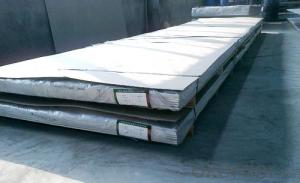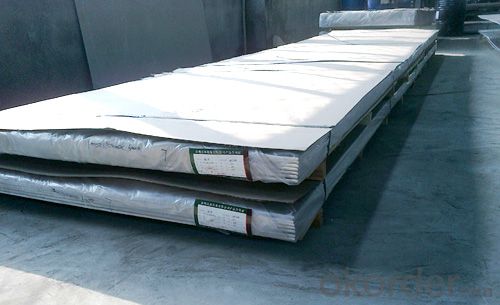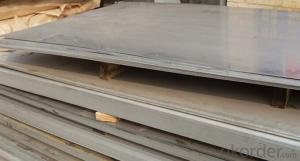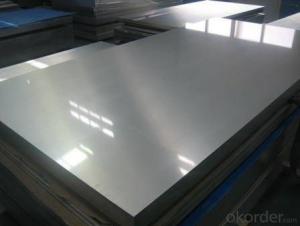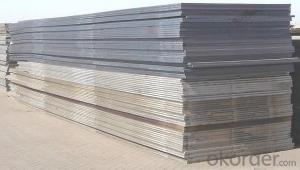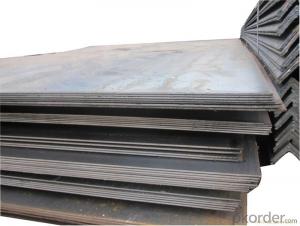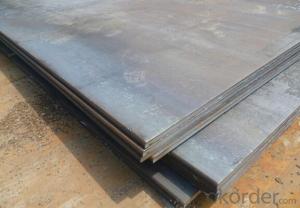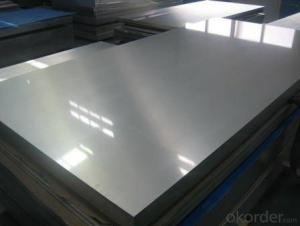Hot Rolled Carbon Steel Sheet_Plate Thickness
- Loading Port:
- Tianjin
- Payment Terms:
- TT OR LC
- Min Order Qty:
- 3 m.t.
- Supply Capability:
- 10000 m.t./month
OKorder Service Pledge
OKorder Financial Service
You Might Also Like
Specification
Hot Rolled Carbon Steel Sheet_Plate Thickness
Thickness:0.6-200mm
Width:1000-4000mm
MOQ: 1 ton
Certificate:ISO,SGS
Hot Rolled Carbon Steel Sheet_Plate Thickness
Commodity | Carbon Steel Hot Rolled Coil_Plate_Strip_Sheet |
Thickness | 0.6-200mm |
Width | 1000-4000mm |
Length | as custom's request |
Technique | Cold rolled or hot rolled mild steel plate |
Surface treatment | Bare, galvanized coated or as customer's requirements. |
Standard | ASTM,EN,GB,JIS |
Material | SS330, SS400, SPHC, SPHD, SPHE, Q195, Q195L, Q235, Q345, 08AL |
Usage | 1. Automobile, Bridges, Buildings,
2. Machinery, Pressure vessel industries.
3. Ship building, Engineering construction,
4. Mechanical manufacturing, Pavement slab, ect.
|
Terms of Payment | 30% T/T as deposit and 70% T/T balance againest B/L copy. |
Delivery Detail | Within 3-15 days after receipt of deposited for the mild steel plate |
CNBM Introduction of Hot Rolled Carbon Steel Sheet_Plate Thickness
CNBM International Corporation is the most import and export platform of CNBM group(China National Building Material Group Corporation) ,which is a state-owned enterprise, ranked in 270th of Fortune Global 500 in 2015.
With its advantages, CNBM International are mainly concentrate on Cement, Glass, Iron and Steel, Ceramics industries and devotes herself for supplying high quality series of refractories as well as technical consultancies and logistics solution.
After-sale service |
|
Advantages
|
|
Packaging & Delivery of Hot Rolled Carbon Steel Sheet_Plate Thickness
Packaging Detail | Sea worthy packing /as per customer's packing instruction |
Delivery Detail | 15 ~ 40 days after receiving the deposit |
Products
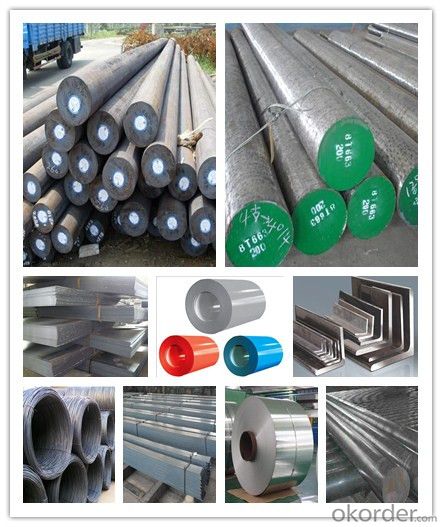
FAQ:
Are you a trading company or manufacturer? | Manufacturer |
What’s the MOQ? | 3 metric ton |
What’s your delivery time? | 15-35 days after downpayment received |
Do you Accept OEM service? | Yes |
what’s your delivery terms? | FOB/CFR/CIF |
What's the Payment Terms? | 30% as deposit,70% before shipment by T/T |
Western Union acceptable for small amount. | |
L/C acceptable for large amount. | |
Scrow ,Paybal,Alipay are also ok | |
Why choose us? | Chose happens because of quality, then price, We can give you both. Additionally, we can also offer professional products inquiry, products knowledge train (for agents), smooth goods delivery, excellent customer solution proposals. |
What's your available port of Shipment? | Main Port, China |
What’s your featured services? | Our service formula: good quality+ good price+ good service=customer's trust
|
Where are your Market? | Covering more than 160 countries in the world |
- Q: What are the different methods of improving the creep resistance of special steel?
- There are several methods for improving the creep resistance of special steel. One approach is through alloying, where specific elements such as chromium, molybdenum, and tungsten are added to enhance the steel's creep resistance. Another method involves heat treatment processes such as annealing or quenching and tempering, which can refine the microstructure and increase the steel's resistance to creep deformation. Surface treatments like carburizing or nitriding can also be employed to improve the creep resistance of special steel. Furthermore, controlling the grain size and texture through techniques like grain refinement or grain boundary engineering can enhance the steel's resistance to creep. Finally, proper design considerations, such as reducing stress concentrations and optimizing component geometry, can also contribute to improving the creep resistance of special steel.
- Q: What are the common quality control measures for special steel?
- Common quality control measures for special steel include: 1. Chemical Composition Analysis: Special steel often requires specific chemical compositions to meet the desired properties. Quality control measures involve analyzing the chemical composition through techniques like spectrometry to ensure it meets the required specifications. 2. Mechanical Testing: Special steel needs to possess specific mechanical properties such as strength, hardness, toughness, and ductility. Quality control measures involve conducting mechanical tests like tensile testing, hardness testing, impact testing, and fatigue testing to ensure the steel meets the required standards. 3. Non-Destructive Testing: Non-destructive testing methods like ultrasonic testing, magnetic particle testing, and dye penetrant testing are employed to detect any internal or surface defects in the steel. These tests help ensure the integrity and reliability of the special steel. 4. Dimensional Inspection: Special steel often requires precise dimensions for its intended application. Dimensional inspection involves measuring the length, width, thickness, diameter, and other critical dimensions to ensure they meet the required tolerances specified by the customer or industry standards. 5. Surface Quality Inspection: Special steel may require specific surface finishes or coatings to enhance its performance or resistance to corrosion. Quality control measures involve inspecting the steel surface for defects such as cracks, pits, scratches, or unevenness to ensure it meets the required surface quality standards. 6. Heat Treatment Verification: Special steel often undergoes heat treatment processes like annealing, quenching, or tempering to achieve the desired mechanical properties. Quality control measures involve verifying the effectiveness of the heat treatment process through hardness testing or microstructure analysis. 7. Documentation and Traceability: Quality control measures also involve maintaining comprehensive documentation and traceability records of the special steel, including details of its production process, chemical composition, mechanical properties, and any inspections or tests performed. This helps ensure quality consistency and provides a reference for future use or troubleshooting. By implementing these quality control measures, manufacturers can ensure that special steel meets the required specifications, providing customers with high-quality and reliable products for their specific applications.
- Q: What are the different types of maraging steel?
- There are several different types of maraging steel, including Maraging 200, Maraging 250, Maraging 300, and Maraging 350. Each type has different composition and properties, but they all share the common characteristic of being a high-strength, low-alloy steel that can be heat treated to achieve exceptional strength and toughness.
- Q: Can special steel be used in the medical device manufacturing industry?
- Yes, special steel can be used in the medical device manufacturing industry. Special steel alloys, such as stainless steel, are commonly used in the production of medical devices due to their excellent corrosion resistance, biocompatibility, and mechanical properties. These materials provide durability, sterilization compatibility, and are suitable for various medical applications, including implants, surgical instruments, and diagnostic equipment.
- Q: What are the magnetic properties of special steel?
- Special steel can exhibit a range of magnetic properties, depending on its composition and treatment. Some special steels, such as austenitic stainless steel, are non-magnetic due to their high nickel content. On the other hand, certain types of special steel, like ferritic or martensitic stainless steel, can be magnetic. Additionally, some special steels can be made magnetic through processes like heat treatment or cold working. Therefore, the magnetic properties of special steel can vary and are influenced by several factors.
- Q: What are the properties and characteristics of special steel?
- Special steel refers to a category of steel that has unique properties and characteristics, making it suitable for specific applications that require exceptional strength, durability, and resistance to various environmental factors. Some of the properties and characteristics of special steel include: 1. High Strength: Special steel is known for its exceptional strength, allowing it to withstand heavy loads and extreme conditions. This makes it ideal for applications that require structural integrity and durability, such as construction, automotive, and aerospace industries. 2. Excellent Corrosion Resistance: Special steel is often alloyed with elements like chromium and nickel, which enhance its resistance to corrosion and oxidation. This property makes it highly valuable in environments where exposure to moisture, chemicals, or extreme temperatures may cause conventional steel to deteriorate rapidly. 3. Heat Resistance: Special steel is designed to retain its mechanical properties and structural integrity even at high temperatures. It exhibits excellent thermal stability, which makes it suitable for applications involving intense heat, such as power generation, oil and gas industries, and manufacturing processes. 4. Wear Resistance: Special steel is often hardened and treated to enhance its wear resistance. This property allows it to withstand abrasive materials, friction, and erosion, making it suitable for cutting tools, machine parts, and wear-resistant components in heavy machinery. 5. Magnetic Properties: Certain types of special steel exhibit magnetic properties, which make them ideal for applications in the electrical and electronics industries. Examples include electrical transformers, motors, generators, and magnetic shielding. 6. Machinability: Special steel is designed to be easily machinable, meaning it can be shaped, formed, and fabricated into various components with precision. This property is important for industries that require complex and intricate parts that can be efficiently produced. 7. Cost-effectiveness: Despite its unique properties, special steel is often cost-effective compared to other materials with similar performance characteristics. Its long lifespan, resistance to corrosion and wear, and versatility make it a preferred choice for numerous applications, offering a balance between performance and cost. Overall, special steel combines exceptional strength, resistance to corrosion and wear, heat resistance, and magnetic properties, making it a versatile material used in various industries. Its unique properties make it an essential component in applications where standard steel or other materials would not suffice.
- Q: What are the main advantages of using special steel in the mining industry?
- The main advantages of using special steel in the mining industry are its exceptional strength, durability, and resistance to wear and tear. Special steel can withstand the harsh conditions and extreme forces encountered in mining operations, ensuring the longevity of equipment and machinery. Additionally, its high resistance to corrosion and heat makes it ideal for mining processes involving chemicals and high temperatures. Overall, the use of special steel enhances the efficiency, safety, and productivity of mining operations.
- Q: What are the different marine grades of special steel?
- There are several different marine grades of special steel that are specifically designed to withstand the harsh conditions of marine environments. These grades are typically categorized based on their corrosion resistance and mechanical properties. One of the most commonly used marine grades of special steel is 316 stainless steel. It contains a higher percentage of molybdenum and nickel, which enhances its resistance to corrosion from saltwater and other harsh chemicals. This grade is often used for marine hardware, such as bolts, nuts, and screws, as well as for marine structures and equipment. Another marine grade of special steel is 2205 duplex stainless steel. This grade has a higher strength and better corrosion resistance compared to 316 stainless steel. It is often used in marine applications that require high strength and durability, such as propeller shafts, offshore structures, and pressure vessels. There is also 5083 aluminum-magnesium alloy, which is commonly used in marine applications where weight is a concern. This grade of special steel offers excellent corrosion resistance and high strength, making it suitable for boat hulls, superstructures, and other lightweight marine components. Additionally, there are various high-strength low-alloy (HSLA) steels that are used in marine applications. These steels are specifically designed to provide superior strength and toughness while also offering good corrosion resistance. They are often used for shipbuilding, offshore drilling rigs, and other marine structures that require high strength and durability. Overall, the different marine grades of special steel provide a range of options for various marine applications. The choice of grade depends on the specific requirements of the project, including the level of corrosion resistance, strength, and weight considerations.
- Q: What are the main factors affecting the machinability of special steel?
- The machinability of special steel, which refers to its ability to be easily cut, shaped, and formed, is influenced by several key factors. 1. Alloy Composition: The chemical composition of special steel plays a crucial role in its machinability. Elements such as carbon, chromium, nickel, and molybdenum can significantly affect the material's hardness, toughness, and cutting properties. Higher carbon content, for example, can increase the hardness of steel, making it more difficult to machine. 2. Hardness: The hardness of special steel is a critical factor in determining its machinability. Harder steels require more cutting force and generate more heat during machining, which can lead to increased tool wear and reduced efficiency. Softer steels, on the other hand, are generally easier to machine but may result in lower tool life. 3. Heat Treatment: The heat treatment process used on special steel can greatly impact its machinability. Heat treatments such as annealing, tempering, or quenching can alter the steel's microstructure and mechanical properties, affecting how it responds to cutting forces. Properly heat-treated steel can improve machinability by reducing hardness and increasing toughness. 4. Grain Size: The size and distribution of grains within the steel also affect its machinability. Fine-grained steel tends to have improved machinability compared to coarse-grained steel, as smaller grains offer more uniform cutting conditions and reduce the risk of tool damage. 5. Cutting Speed and Feed Rate: Machining parameters, including cutting speed and feed rate, directly impact the machinability of special steel. Higher cutting speeds can increase tool wear and generate excessive heat, affecting the surface finish and dimensional accuracy. Similarly, incorrect feed rates can cause chip formation problems, leading to poor machinability. 6. Cutting Tool Selection: The choice of cutting tool material and geometry is critical in achieving optimal machinability. Different tool materials, such as carbide or high-speed steel, have varying wear resistance and cutting properties. The tool geometry, including rake angle and clearance angle, also affects chip formation, cutting forces, and heat generation. 7. Lubrication and Cooling: Adequate lubrication and cooling during machining are vital to enhance machinability. Lubricants or coolants help reduce friction and heat, prolong tool life, and improve chip evacuation. They also prevent workpiece deformation and improve surface finish. Considering these factors, it is essential to carefully select the appropriate special steel grade, optimize machining parameters, and use suitable cutting tools and lubrication to achieve the desired machinability and maximize productivity.
- Q: How does special steel contribute to the manufacturing of cutting blades for industrial machines?
- Special steel plays a crucial role in the manufacturing of cutting blades for industrial machines by offering enhanced strength, durability, and wear resistance. The unique properties of special steel, such as high hardness, toughness, and corrosion resistance, allow cutting blades to withstand the demands of heavy-duty applications. This enables them to cut through various materials, such as metal or concrete, with precision and efficiency, resulting in improved productivity and longevity of industrial machines.
Send your message to us
Hot Rolled Carbon Steel Sheet_Plate Thickness
- Loading Port:
- Tianjin
- Payment Terms:
- TT OR LC
- Min Order Qty:
- 3 m.t.
- Supply Capability:
- 10000 m.t./month
OKorder Service Pledge
OKorder Financial Service
Similar products
Hot products
Hot Searches
Related keywords
